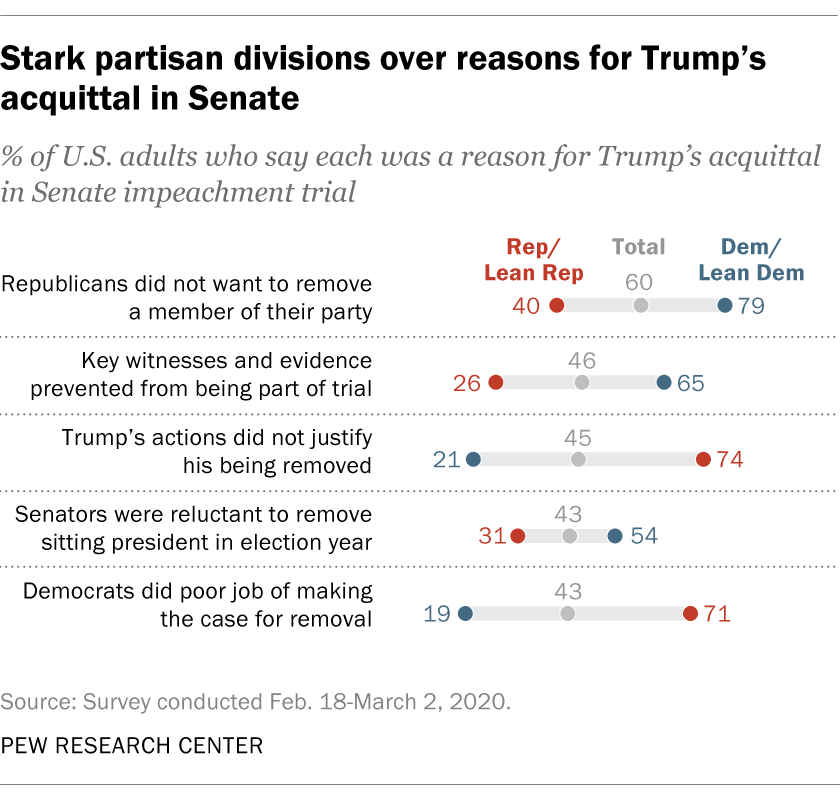When Americans look back on Donald Trump’s Senate impeachment trial – which ended just over a month ago – a quarter say the president did nothing wrong, according to a Pew Research Center survey conducted Feb. 18-March 2.
The survey also explored the reasons why Americans think Trump was acquitted.
Trump became just the third U.S. president ever to be impeached – after Andrew Johnson in 1868 and Bill Clinton in 1998 – when the House formally charged him in mid-December with abusing his power and obstructing Congress. The charges stemmed from allegations that Trump inappropriately pressured the government of Ukraine to launch investigations into his potential opponent in this year’s presidential election, former Vice President Joe Biden. The Senate acquitted Trump of the House’s charges in early February.
To learn more about Americans’ views on the impeachment of President Donald Trump, we surveyed 10,300 U.S. adults from Feb. 18-March 2 – the second survey in the Center’s nearly yearlong Election News Pathways project.
Everyone who took part is a member of the Center’s American Trends Panel, an online survey panel that is recruited through national, random sampling of residential addresses. Recruiting our panelists by phone or mail ensures that nearly all U.S. adults have a chance of selection. This gives us confidence that any sample can represent the whole population (see our Methods 101 explainer on random sampling). To further ensure that each survey reflects a balanced cross section of the nation, the data is weighted to match the U.S. adult population by gender, race, ethnicity, partisan affiliation, education and other categories.
Here are the questions asked in this survey, along with responses, and its methodology.
Democrats and Democratic-leaning independents are far more likely than Republicans and GOP leaners to believe that Trump did something wrong related to Ukraine and that it warranted his removal. Eight-in-ten Democrats say this, versus just 7% of Republicans. Around four-in-ten Republicans (41%) say Trump did something wrong but that it was not enough to warrant his removal, while 51% say he did nothing wrong.
Partisans who get their political news exclusively from outlets with like-minded audiences are sharply divided in their views of Trump’s conduct. Around eight-in-ten Republicans who get political news only from outlets with right-leaning audiences (78%) say Trump did nothing wrong when it comes to Ukraine. An even larger share (83%) of Democrats who get news only from outlets with left-leaning audiences say Trump did something wrong and that it warranted his removal as president. (For more on how the Center measured the ideology of news outlets’ audiences, see this recent Q&A.)
The stark partisan gap in these views is similar to the one observed in a survey before the Senate impeachment trial began. In that survey, 85% of Democrats and Democratic leaners said the Senate’s trial should result in Trump’s removal, while a nearly identical share of Republicans and GOP leaners (86%) said it should not.
The more recent survey is part of the Center’s nearly yearlong Election News Pathways project, an initiative focused on what Americans hear, perceive and know about the 2020 presidential election and how these attitudes relate to how and where they get news. You can access all of the data related to the public’s views of Trump’s impeachment in this interactive data tool.
Perceived reasons for Trump’s acquittal

When it comes to why Trump was acquitted by the Senate, a majority of U.S. adults (60%) say one reason is that Republicans didn’t want to remove a president of their own party. Fewer than half of Americans see four other factors as reasons – that key witnesses and evidence were prevented from being part of the trial (46%), that Trump’s actions did not justify his being removed from office (45%), that senators were reluctant to remove a sitting president in an election year (43%) and that Democrats did a poor job of making the case for removal (43%).
Partisan differences are wide across all five of the potential reasons for acquittal asked about in the survey. For example, 71% of Republicans say a reason for Trump’s acquittal is that Democrats did a poor job of making the case for removal; just 19% of Democrats see this as a reason. Conversely, around two-thirds of Democrats (65%) say a reason is that key witnesses and evidence were prevented from being part of the Senate proceedings; only around a quarter of Republicans (26%) take this view.
Again, there are wide differences between partisans depending on their news diets. For instance, 84% of Democrats who get political news only from outlets with a left-leaning audience say a reason for the Senate’s acquittal of Trump is that Republicans didn’t want to remove a president from their own party. Among Republicans who get political news exclusively from outlets with a right-leaning audience, just 28% say this was a reason why Trump was acquitted.
Most Americans know that a GOP senator voted to convict
The Senate’s vote to acquit Trump was divided along partisan lines, with one exception: Republican Sen. Mitt Romney of Utah joined all Democrats to convict Trump on the charge of abuse of power.
When asked whether any Republicans voted to convict Trump in the Senate trial, around two-thirds of Americans (66%) correctly say yes, while 12% incorrectly say no and 22% say they aren’t sure. Similar majorities of Republicans (69%) and Democrats (65%) answer the question correctly.
A Gallup survey just after the Senate impeachment trial found a major shift in partisans’ views of Romney. In that survey, 56% of Democrats and Democratic leaners expressed a favorable view of the Utah senator, compared with just 23% of Republicans and GOP leaners. The share of Democrats with a favorable view of Romney was up 19 percentage points from Gallup’s prior survey about him in February 2019, while the share of Republicans with a positive view was down 22 points. Overall, 39% of Americans had a favorable view of Romney, which was unchanged from a year ago.
Note: Here are the questions asked in this survey, along with responses, and its methodology.
